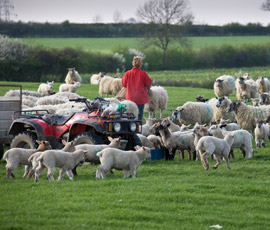High demand disrupts livestock feed supplies

Farmers are facing long waiting periods for deliveries of animal feeds, as suppliers struggle to cope with a surge in demand caused by the bad weather.
Emyr Jones of feed manufacturer and supplier Wynnstay said demand for feed was at its highest for 60 years.
Mr Jones said there had been an unprecedented demand for lamb pellets, with farmers hoping to finish lambs while trade was still high.
Orders usually take two to three working days to be delivered, but they had been taking at least a week until recently.
“When the snow came we had serious problems, because we couldn’t get to farms, and after that demand exceeded expectation because grass wasn’t growing,” explained Mr Jones.
He said it had hit at the worst possible time, as mills expected high demand in January and February, but by March animals were usually out at grass.
Other companies have reported similar problems.
Feed supplier Carmarthen and Pumpsaint Farmers confirmed their lead times had doubled for April.
Manager Paul Rogers said normally animal feed would be delivered in three to four days, but a spike in demand for compound feed meant deliveries had been taking seven to 10 days.
In the meantime, livestock farmers are being forced to buy smaller quantities at a premium price as they struggle to replenish supplies.
Welsh sheep farmer Will Davis, of Maesmawr Farm, Glascoed, Monmouthshire, was told by his regular supplier there would be a 10-day wait on feed when he rang up to order sheep cake for 100 store lambs.
“It is a nightmare to get feed when you want it. Since about the middle of February there’s been a humongous wait for feed.
“I rang up on a Monday and they said it wouldn’t be delivered until a week Thursday.”
In a desperate attempt to get feed delivered sooner to avoid running out he bought 25kg bags of his usual ration from a different supplier, but he had to pay an additional £50/t.
“You don’t want to be changing the rations so late in the season, especially when the lambs are only a week and a half from finishing.”
He added: “It is almost impossible to predict how much feed to buy when you are constantly buying in new stock. And with the weather being so unpredictable, we are constantly changing the amount they’re being fed.”
The Farmers Union of Wales confirmed it had been in emergency talks with the Welsh government. But they said they were confident suppliers were doing everything they could to get feed to farmers.
Meanwhile, feed companies said they were hopeful the situation would return to normal by next week.
Livestock losses mount in winter freeze
Wean lambs early to safeguard performance
